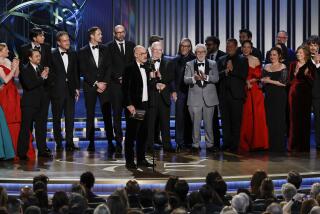‘Game of Thrones’ series finale is approaching. How will HBO survive after it?
The crowd packed into New York’s Radio City Music Hall for the final-season premiere of HBO’s juggernaut drama “Game of Thrones.” As audience members took their seats, they were greeted by an announcer who said: “Welcome to the beginning of the end.”
For many who attended the gathering earlier this month, it was not hard to hear a more ominous meaning in those words.
Ending a major hit show is not easy for any network. But the departure of “Game of Thrones,” which begins its eighth and farewell season on Sunday, comes at a critical crossroads for HBO. The network has a new owner, and its longtime status as the most distinctive brand name in television can no longer be taken for granted.
“Game of Thrones” has been not only a cultural touchstone, but a ratings behemoth for HBO. The drama about the warring factions of the fictional land of Westeros, based on George R.R. Martin’s best-selling books, spurred millions of viewers to sign up for HBO’s young streaming service. The series has nabbed 47 Emmy Awards and established lofty standards for splashy TV productions. It elevated HBO’s global profile in a way that “The Sopranos,” its signature series about a New Jersey mob boss, had not.
Now, the question is how the premium cable network can adapt without its critical darling, especially at a time when it faces rising competition from Netflix, Amazon.com, Walt Disney Co. and others.
“It’s a problem when your biggest hit show goes away,” said Michael Nathanson, media analyst at the New York-based MoffettNathanson Research. “The downside is that it is easier for people to drop their subscription to HBO, particularly for the streaming service.”
HBO declined to comment for this story.
The end of “Game of Thrones,” which will unfold over six episodes this spring, comes during a transition period for HBO and its corporate family. HBO became a global taste-making force by operating as an autonomous, risk-taking and highly profitable venture within Time Warner Inc., which also owned CNN and the Warner Bros. movie and television studio in Burbank.
In June, telecommunications giant AT&T acquired Time Warner in an $85-billion deal that ushered in a new era and a dramatically different corporate culture. AT&T executives, who renamed the company WarnerMedia, often talk about movies and TV as a means to keep its mobile phone customers hooked on their tiny screens. Then last month came a shake-up in HBO’s management, raising questions about potential changes in HBO’s programming.
“They’ve had this management shake-up with the chief executive and other members of the creative team leaving,” said Deana Myers, research director for S&P Global Market Intelligence. “So you have to wonder, what direction is the company going to go? It feels like it is in limbo right now.”
Internal hand-wringing that typically comes with ownership changes escalated once HBO’s longtime chairman, Richard Plepler, announced his departure in late February to make way for AT&T managers to install their own team. Bob Greenblatt, former NBC Entertainment chairman, was named chairman of the newly christened WarnerMedia Entertainment group, in charge of HBO and the Turner general entertainment channels. Other senior HBO executives have left, too, as the company looks to consolidate operations.
Greenblatt, in an interview last month, acknowledged that HBO needed to increase its pipeline of programming, one of the AT&T mandates. Even before he arrived, HBO had increased the number of original scripted episodes by 50% compared with last year.
“We are in a volume world, we all know that. But we are never going to be in the volume world of Netflix,” Greenblatt said. “We couldn’t deliver 10 times the number of shows that we do on HBO now, even if the purse strings were just flowing. But we have to ramp up over the next few years.”
FULL COVERAGE: The final season of ‘Game of Thrones’ »
There are concerns among some within the company that HBO will no longer be a crown jewel but a chief supplier for WarnerMedia’s planned video streaming service. One WarnerMedia executive who spoke on the condition of anonymity said the approach risks taking the TV equivalent of a flagship luxury store off Rodeo Drive and putting it into a shopping mall.
Greenblatt said the goal isn’t to downgrade HBO’s fare. “I really want it to be the great network it has always been,” he said.
AT&T executives have asked HBO to increase its output, raising fears that the commitment to quality might be diluted. Greenblatt, however, is no stranger to the concept of delivering prestige programs for a mass audience. He produced “Six Feet Under,” one of the early original HBO series hits. Before running NBC’s entertainment, Greenblatt was the programming head of HBO’s main premium cable rival, Showtime (from 2003 to 2010), where he transformed the channel with such hits at “Dexter,” “Weeds” and “Nurse Jackie.”
HBO has plans for several “Game of Thrones” spinoffs and prequels. And there are other highly anticipated shows in the pipeline, including the second season of “Big Little Lies,” with Reese Witherspoon and Nicole Kidman, and “Watchmen,” a new series based on the classic 1980s comic book produced by Damon Lindelof (“Lost”) with a cast including Jeremy Irons, Regina King and Don Johnson.
The network is losing its Emmy-winning comedy “Veep,” starring Julia Louis-Dreyfus, but it can continue to count on its established favorites “Silicon Valley,” “Barry,” “Last Week Tonight with John Oliver,” “Westworld” along with a strong slate of documentaries.
Still, Plepler’s departure has stirred anxieties. He was seen as the protector of HBO’s brand, ambitions and renegade spirit. Plepler declined to comment.
At the recent Radio City Music Hall event, HBO programming chief Casey Bloys and producers David Benioff and D.B. Weiss heaped so much praise on Plepler for his support of “Game of Thrones,” audience members might have expected to see the former executive triumphantly fly himself out of the legendary New York theater on a dragon.
Instead, Plepler quietly exited the screening while guests headed to the glittery post-premiere party up the street at the Ziegfeld Ballroom. Some of them ruminated over the uncertainty ahead for HBO.
Plepler was not a longtime program developer — he headed communications before being elevated to co-president in 2007. But he was a highly effective cheerleader who helped build HBO’s quality mystique and was able to harness creative energy and risk-taking. His skills were clearly demonstrated through the success of “Game of Thrones.”
It was Plepler who signed off on a TV adaptation of the fantasy novels by Martin that included incest and dragons as plot points. He approved an expensive pilot and pricey re-shoots. He signed off on having two writers, Benioff and Weiss, run the series even though they were not seasoned TV producers.
The estimated budgets of $15 million per episode involved multiple overseas locations. Over its eight seasons, the series was shot in 10 countries, including Northern Ireland, Morocco, Croatia and Iceland, and included more than three dozen special effects houses in 13 countries.
Over the years, more than 3,748 pounds of rubber and 1.5 tons of metal went toward weaponry, including 1,300 shields for soldiers. Producers used 52,000 bags of paper snow, 4,000 gallons of fake blood, 12,137 wigs and hairpieces and 12,986 extras in Northern Ireland alone.
Such budgets were previously unheard of in a television world where $5 million for an hour drama was long considered a splurge.
The payoff is a global phenomenon that has seen its audience grow in every season, which is rare in the world of television. HBO said the seventh season of “Game of Thrones,” which was televised in 2017, was watched by an average of 32.8 million U.S. viewers across its networks and streaming platforms. That’s up from 9.3 million in the first season. The series is being shown more than 150 countries.
“Game of Thrones” powered much of HBO’s growth. For example, HBO Networks (which includes the sister movie channel Cinemax) ended 2011 with 93 million subscribers worldwide and $4.5 billion in annual revenue, according to regulatory filings. Last year, the networks had 140 million subscribers globally and $6.6 billion in revenue. Operating income grew from $1.4 billion in 2011 to $2.4 billion in 2018.
The subscriber numbers include more than 7 million sign-ups for the HBO Now streaming service, which launched four years ago. The debut of the service was tied to the Season 4 premiere of “Game of Thrones.” Demand was so strong that the new platform had trouble handling the capacity of users when some episodes premiered.
Audience data firm Parrot Analytics found that “Game of Thrones” is among the most anticipated series finales ever. By measuring social media mentions, browser searches, online views of show trailers earlier this month and downloads of pirated episodes, the Los Angeles firm determined interest in “Game of Thrones” is more than 250 times in greater demand than for an average TV show.
“We are racing toward the biggest event, perhaps ever, in television history,” said Samuel Stadler, Parrot’s vice president of marketing. “We are talking about the world’s most in-demand television show.”
Some analysts think concerns about HBO’s future might be overblown.
Nathanson, the analyst, noted that HBO’s business didn’t suffer last year when “Game of Thrones” was on hiatus, a sign that consumers are satisfied with its other offerings.
“There is just a ton of programming available on HBO, although it is not nearly the supermarket that Netflix is,” Nathanson said. “Netflix has programming for 365 days a year, and that’s why WarnerMedia is ramping up its programming pipeline.”
Brett Sappington, senior director at the research firm Parks Associates in Addison, Texas, said another positive sign is how HBO Now subscriptions continued to grow in 2017 — after “Game of Thrones” finished its season. The streaming service started the year with 2 million subscribers and finished with 5 million, even though the show’s run ended in February.
“This is a show that will remain in demand for quite some time,” Stadler said, noting that it will continue to live on. “When is the Harry Potter universe ever done?”
More to Read
Inside the business of entertainment
The Wide Shot brings you news, analysis and insights on everything from streaming wars to production — and what it all means for the future.
You may occasionally receive promotional content from the Los Angeles Times.








